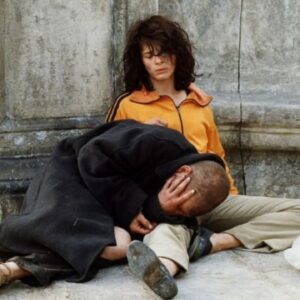In the 1950s Anjette Lyles owned and operated the most popular restaurant in Macon, Georgia. She was an attractive blonde, drove a flashy Cadillac, and hugged every single customer who came into her establishment. She spoke lovingly at every table, dressed in her blue satin dress with the puffy crinoline petticoat. “Hey Betty Anne, gimme some sugar. And Paul, don’t you look just as handsome as you wanna be?” People came into her place as much for her as for the food. “Everybody loves Anjette.”
That’s why the whole town was shocked when she was arrested for murder in May of 1958.
She’d come by Anjette’s through hard work and tough times. Her first husband, Benjamin Lyles, was the original owner of the place, then called Lyles’s Restaurant. It had been a family business for thirty years when Ben married Anjette in October of 1947. They had a daughter, Marcia, the following July and a second daughter, Carla, in 1951. But Ben was a heavy drinker, and Anjette ran the place, with a little help from her mother-in-law Julia.
Then, in May of 1951, Ben sold the restaurant very suddenly for only $2,500—without telling anyone. Anjette did not say a word, but by December, Ben began bleeding from his nose and mouth. Then he became delirious and convulsive. He died in January of 1952. The doctors said it was encephalitis.
Anjette, a widow with two children, worked her fingers to the bone and was able to buy back the restaurant in 1955 for $12,000. It reopened as Anjette’s the same year that another Macon resident, James Brown, recorded his first single Please, Please, Please. Things were moving forward in Macon, Georgia.
When people came into the new place, they would tell Anjette how much they admired her perseverance. She would say, “Lord, I had to do everything myself. I only thank God that my drunkard husband had some kind of insurance.”
The place served good old-fashioned southern food. Her most popular recipe was bacon balls served with lemonade. “Make a dressing of breadcrumbs and chopped onions,” she told anyone who wanted to know, “add an egg, salt, and pepper. Mix that with milk, then spread out your strips of bacon and add a thin layer of dressing mixture. Roll it all up and stick it with toothpick and fry it in hot grease until it’s brown. It’s good!” Deep fried bacon.
The same year she opened her eponymous eatery, she met Buddy Gabbert, an airline pilot and a military veteran. It was love at first flight: she flew to Texas to visit with him in his home. And on June 24th, only months after they’d met, they woke up a Justice of the Peace in New Mexico and got hitched. It was heaven for around six months. Buddy died in December.
First he developed a rash, then he couldn’t eat, then his arms and legs swelled up. He was in such misery he actually said to people, “Let me die.”
When he did, Anjette didn’t grieve. She was the very model of a strong southern woman. But she was heard to say, “Thank God Buddy had him a little bit of insurance money!”
Not long after Buddy died, Anjette began to pester her mother-in-law Julia. She was often heard to ask, “Julia, why don’t you have me in your will?”
Julia’s mumbled answer was that Anjette was a witch who had murdered both of her husbands. Anjette would laugh and slap her thighs. But she wouldn’t deny the accusations.
Still, the restaurant grew in popularity. Anjette was quick to say that her experiments in the supernatural were responsible for her success. The diner even became something of a destination for visitors from as far away as Atlanta.
Then, in August of 1957, Anjette’s mother-in-law Julia began to complain of chills and fever. Not long after that, she turned noticeably purple, her arms and legs began to swell, and she was hospitalized. She died in September.
Anjette was reverential. “Do you know that sweet woman included me in her will?”
Everyone began to say that tragedy seemed to follow their beloved hostess. Such a shame. Especially when her daughter Marcia developed a hacking cough and a fever of 106 degrees.
“She’ll soon be going home to her father and her grandmother,” Anjette was heard to say.
And Marcia did die, in April of 1958.
“I’m just glad my little girl was insured,” Anjette told one of the attending nurses at the hospital.
It was at this point that one of the restaurant employees had seen enough and sent an anonymous letter to the coroner. It suggested that he look for a whole lot of poison over at Anjette’s house, poison that might have had something to do with Anjette’s misfortunes.
The coroner instantly tested Marcia’s body and found massive amounts of arsenic.
Still, everyone in town was stunned when Anjette was indicted for Marcia’s murder. And worse: the prosecution was allowed to introduce evidence related to the other three deaths.
The trial began the following October, and everyone in town gossiped about it. Because it was a show.
Restaurant employees told tales in open court: they often heard Anjette screaming at her daughter, “I’ll kill you one day, Marcia!”
Hospital employees had their say, too. Anjette would bring food to her victims in their rooms, but before she gave it to them, she’d go into the bathroom for a while. And she would take the food and her purse.
Julia’s will was found to be a forgery.
And it was presented that two weeks before Marcia died, when the doctors were telling Anjette that her daughter might recover, Anjette laughed out loud—and ordered a little coffin.
The town turned against her after hearing all that testimony. There were actually signs held outside the courtroom that read, “Burn the Witch!”
In the end, Anjette was convicted by overwhelming evidence. The trial only lasted a week. The jury took less than an hour to find her guilty. The judge only needed three minutes to sentence Anjette to death in the electric chair.
But the city fathers were agreed that Macon would not go down in history as the first United States town to execute a Caucasian woman for murder. So in 1958 Anjette was found “criminally insane” and committed, for the rest of her life, to the state mental hospital in Milledgeville, Georgia, with the caveat that if she ever “recovered” she would be put to death.
In the hospital, Anjette amused the other patients by telling fortunes and explaining, at length, the finer points of witchcraft. She told some of her closest friends in the facility, “They think I’m crazy as hell and I’m gonna let them keep thinking it. Because if they don’t, they’re gonna fry my ass!”
Anjette Lyles spent twenty years in the State Hospital at Milledgeville. She died there on December 4th of 1977.
**





















